(As told to Cameron Crowe):
1. The audience is fickle.
2. Grab ’em by the throat and never let ’em go.
3. Develop a clean line of action for your leading character.
4. Know where you’re going.
5. The more subtle and elegant you are in hiding your plot points, the better you are as a writer.
6. If you have a problem with the third act, the real problem is in the first act.
7. A tip from Lubitsch: Let the audience add up two plus two. They’ll love you forever.
8. In doing voice-overs, be careful not to describe what the audience already sees. Add to what they’re seeing.
9. The event that occurs at the second act curtain triggers the end of the movie.
10. The third act must build, build, build in tempo and action until the last event, and then — that’s it. Don’t hang around.
1934
Mauvaise graine
1942
The Major and the Minor
1943
Five Graves to Cairo
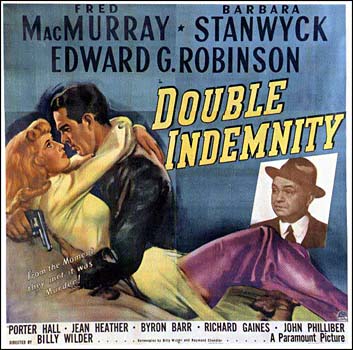
1944
Double Indemnity 94
[ Hard-boiled narration, light coming in through venitian blinds, a dame who’s “not fully covered”… This is noir alright, but with Billy Wilder’s cynical sense of humor offsetting things. Right from their first exchange, sparks are flying between Fred MacMurray and Barbara Stanwyck:
Phyllis: Mr. Neff, why don’t you drop by tomorrow evening about eight-thirty. He’ll be in then.
Walter Neff: Who?
Phyllis: My husband. You were anxious to talk to him weren’t you?
Walter Neff: Yeah, I was, but I’m sort of getting over the idea, if you know what I mean.
Phyllis: There’s a speed limit in this state, Mr. Neff. Forty-five miles an hour.
Walter Neff: How fast was I going, officer?
Phyllis: I’d say around ninety.
Walter Neff: Suppose you get down off your motorcycle and give me a ticket.
Phyllis: Suppose I let you off with a warning this time.
Walter Neff: Suppose it doesn’t take.
Phyllis: Suppose I have to whack you over the knuckles.
Walter Neff: Suppose I bust out crying and put my head on your shoulder.
Phyllis: Suppose you try putting it on my husband’s shoulder.
Walter Neff: That tears it.
Ouch! Then it just gets hotter, scene after scene until… You wouldn’t want to get into this kind of deal because it can only end badly, then again, that very danger is part of the turn-on of a femme fatale! This is genius, from the B&W to the acting, the great lines (courtesy of Wilder and co-writer Raymond Chandler) and the music. Insurance fraud, the perfect murder, an intuitive boss who never has a match for his cigars, “a crazy story with a crazy twist”. Doesn’t get much better than this. ]
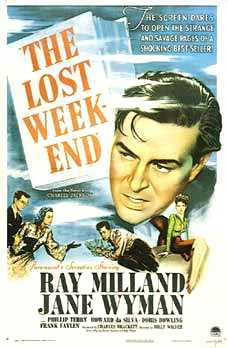
1945
The Lost Weekend 80
[ 1945’s Best Picture Oscar winner is an old-fashioned but nonetheless affecting portrait of alcoholism, desperation and self-destruction. It’s very melodramatic, writerly and “actorly”, too, and it’s hardly as raw a take on the subject as something like “Leaving Las Vegas”. But it still cuts through and gets to what feels like a truly honest place. As in every Wilder film, the storytelling is tight and the direction is masterful. Wilder manages to build suspense numerous times out of whether or not the guy will take a drink, the moody B&W cinematography adds to the sombre, almost noir-like feel of the piece, the use of theremin gives eerie echoes to the score and there are some truly clever visual compositions revolving around bottles and shot glasses. This isn’t quite “Double Indemnity” or “Sunset Blvd.”, but it’s a solid pit stop between the two. ]
1948
The Emperor Waltz
A Foreign Affair
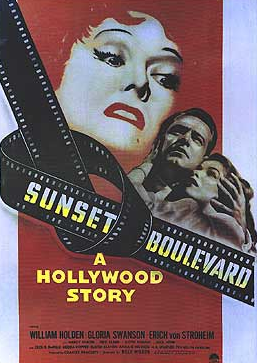
1950
Sunset Blvd. 95
[ Part film noir and part Hollywood satire, this endlessly rewarding film is about the events that led to a homicide in a mansion on the titular road, as recounted by the dead victim! Played by the great William Holden, Joe Gillis is a struggling screenwriter who enters a bizarre relationship with half-mad has been silent film star Norma Desmond, unforgettably portrayed by Gloria Swanson. Gillis also entertains a flirtation with Betty Schaefer (Nancy Olson), a cute reader on the Paramount lot, but Norma has her claws too deep in him to allow her gigolo a chance at a normal life… Boasting exquisitely pulpy dialogue (and narration) and expressionistic B&W cinematography, “Sunset Blvd.” is truly one of the greats. ]
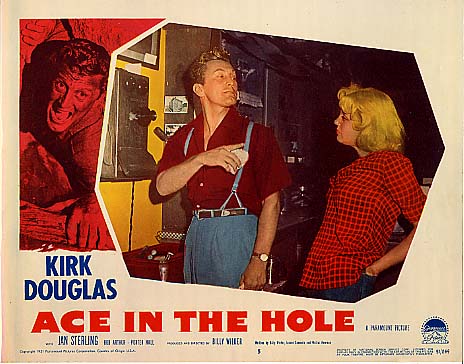
1951
Ace in the Hole 93
[ Kirk Douglas stars as a bullshit artist of a journalist who, after being fired from 11 big city newspapers (!), waltzes into Albuquerque, hustles himself a job at the local paper then bides his time, waiting for that one big story… Or actually, any little story that he can find an angle to make it appear to be big. I guess nothing ever changes, but it still feels like this film was way ahead of his time. Milking a story for all it’s worth might have been a dirty little secret for newspapermen back in the 1950s, but it’s even more common and extreme in this age of 24/7 cable news networks, where it’s all about capturing then holding on to audiences’ attention even though not that much is happening. The movie’s also a twisted joy because of the Western-style New Mexico setting, and then you gotta love the glee with which Douglas throws himself into this utterly amoral, misanthropic, bastardly character and the way he manipulates everybody around him, notably the crooked sheriff and especially the (bleached) blonde femme fatale – watch how he makes her smile disappear! But hey, she pays him back in full, leading to his final fall. “The best fall in movie history,” according to Guy Maddin, and he might be right, though I’m fond of the one by the Dude after he’s drugged by Jackie Treehorn. Anyway, “Ace in the Hole” is prime Wilder. ]
1953
Stalag 17
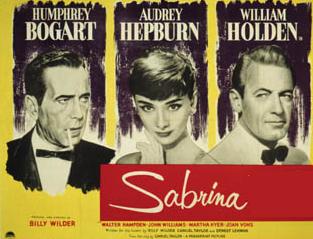
1954
Sabrina 77
[ “Once upon a time, on the north shore of Long Island, some thirty miles from New York, there lived a small girl on a large estate…” How can you not love a movie that starts with storybook narration? “Sabrina” must have felt old-fashioned even back in the day, but that’s part of its charm. The adorable Audrey Hepburn plays a chauffeur’s daughter who’s always lived in the shadows of luxury, invisible to the eyes of rich playboy William Holden. After spending 2 years in Paris, though, she returns transformed into an elegant and sophisticated woman and not only Holden but also his world-weary brother Humphrey Bogart are all over her. Who will win her heart? This is typical romantic fantasy stuff, but with grace and glamour absent from most of today’s movies. This is what Woody Allen calls a “champagne comedy”, where everything looks spectacular and everyone is well dressed and seemingly always drinking champagne. Silly stuff, but endlessly enjoyable. It’s about “throwing open a window and letting in la vie en rose…” ]
1955
The Seven Year Itch 69
[ Often when you watch older films like this, you’re simultaneously struck by how old-fashioned they are, say in the storytelling or in the way the protagonist keeps talking to himself (which may come from the play it’s adapted from), and by the risqué little things they still got away with. Every bit of sexiness, however subtle, seems a bit wilder (Wilder!) considering that this is a 1955 movie. “When it’s hot like this, you know what I do? I keep my undies in the icebox.” Aww, Marilyn Monroe… There’s really only one like her, so bodacious and naive and flirty… No wonder Tom Ewell’s character feels tempted to go at it with her, even though he’s happily married. Well, he’s being an idiot even letting her into his apartment while the wife’s away, of course. If he really wanted to stay faithful, he’d know better and would avoid things like that. But it makes for amusing movie situations, with a whole lotta Marilyn. ]
1957
The Spirit of St. Louis
Love in the Afternoon
Witness for the Prosecution
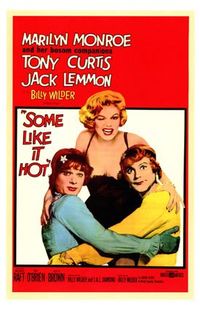
1959
Some Like It Hot 94
[ This is the best comedy of all time according to the American Film Institute. That might be pushing it a bit (I’m partial to “Dr. Strangelove” or “The Producers” myself), but there’s no denying that this is an incredibly witty and enjoyable flick. It starts off like a gritty gangster film in prohibition era Chicago with car chases and shoot-outs and a raid on an illegal booze joint, but the tone lightens up considerably when the story shifts to Tony Curtis and Jack Lemmon as musicians who escape all the surrounding mayhem by taking a gig in Florida… in an all-girl band! The back-and-forth between the two actors in drag is very amusing and supporting actress Marilyn Monroe? Zowie! Now that’s a woman! But she’s also got great comic timing, overflowing charm and a great singing voice to boot. ]

1960
The Apartment 90
[ Funny, charming and smart if old fashioned. Jack Lemmon and Shirley Maclaine are adorable and I love that the ending is left open. ]
1961
One, Two, Three
1963
Irma la Douce
1964
Kiss Me, Stupid
1966
The Fortune Cookie
1970
The Private Life of Sherlock Holmes
1972
Avanti!
1974
The Front Page
1978
Fedora
1981
Buddy Buddy
